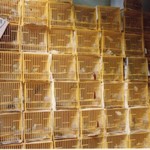 Birdmarket in Hong Kong Photo by ForestPress
Birdmarket in Hong Kong Photo by ForestPress
Conservationist' joy at EU-wide ban
Move is to protect against bird flu
A permanent ban on the import of wild birds into Britain and the rest of the European Union was agreed yesterday in a move that will protect rare species and save millions of animals.
Chief veterinary officers from EU member states met in Brussels to ban wild bird imports on the ground of the health risk posed by avian flu and other diseases.
Imports of poultry into Europe from all but a handful of nations that satisfy European standards of health and welfare are also to be banned.
Popular pet birds such as parrots and macaws are included in the ban, along with 3,000 other species that are traded internationally.
Ben Bradshaw, the Minister for Animal Health and Welfare, had backed calls for a ban. He said that he was delighted with the decision and extended his thanks to campaigners.
The announcement of the ban was greeted with euphoria by conservation groups and animal rights groups, which have for years been demanding that imports of wild birds, many of which are endangered, be halted.
Though the chief veterinary officers voted unanimously for the import controls because of the risk to human health, it was widely believed that campaigns highlighting the threat to conservation and the death toll on captured birds had been a significant factor.
An estimated one million rare birds are trapped and sold annually, with up to 87 per cent of these being imported to Europe. One in ten endangered birds is traded.
A further four million other wild birds are sold worldwide, according to the Royal Society for the Protection of Birds, but up to 60 per cent die before they reach collectors or pet owners.
Graham Wynne, a spokesman for the RSPB, said: “This decision takes wild bird conservation a hugely significant step forward. Millions of birds will now be saved.
“The trade has been a blight on the EU’s conservation and welfare record for far too long and this ban comes none too soon. Now every European government must ensure that the ban is properly policed, that quarantine rules are fully enforced and that there is no opportunity for unscrupulous traders to bend any part of the new law.”
David Bowles, of the Royal Society for the Protection of Animals, also welcomed the decision: “This is fantastic news. It is hugely significant. Its consequences will reverberate around the world.”
The indefinite ban agreed by the EU will come into force this year and comes after a temporary ban introduced in 2005 amid fears that avian flu could be spread by bird imports.
In November the demand for a permanent ban was backed by Tony Blair, who made a direct plea to Brussels.
Markos Kyprianou, the EU Health and Consumer Protection Commissioner, said: “I am very glad that member states could agree to these tighter rules for captive bird imports.
“Such measures are crucial to maintaining the highest possible level of animal health protection in the EU.
“The devastation that the H5N1 avian influenza virus has caused globally serves as a reminder that we can take no chances in this area.”
A few EU-approved nations, including the US, Australia and New Zealand, will continue to be permitted to export pet birds to Europe — but only if they have been reared in captivity. The exporting country will have to prove the absence of avian influenza and Newcastle disease. All imported birds will have to be individually identifiable through a leg-ring or microchip implant. A minimum 30-day quarantine period in an officially approved centre will also be required for all imported captive birds.
On arrival in an EU country, tighter controls will also apply to the movement of the birds from the border inspection post to the quarantine site.
Chris Davies, a Liberal Democrat MEP, said: “Whether on health or animal welfare grounds, the effect is the same. The decision is welcome news and deprives the hunters of their lucrative market.
“Birds should live free in the trees and the forests, not confined to cages in European homes.”



